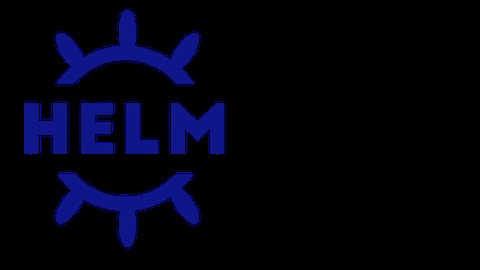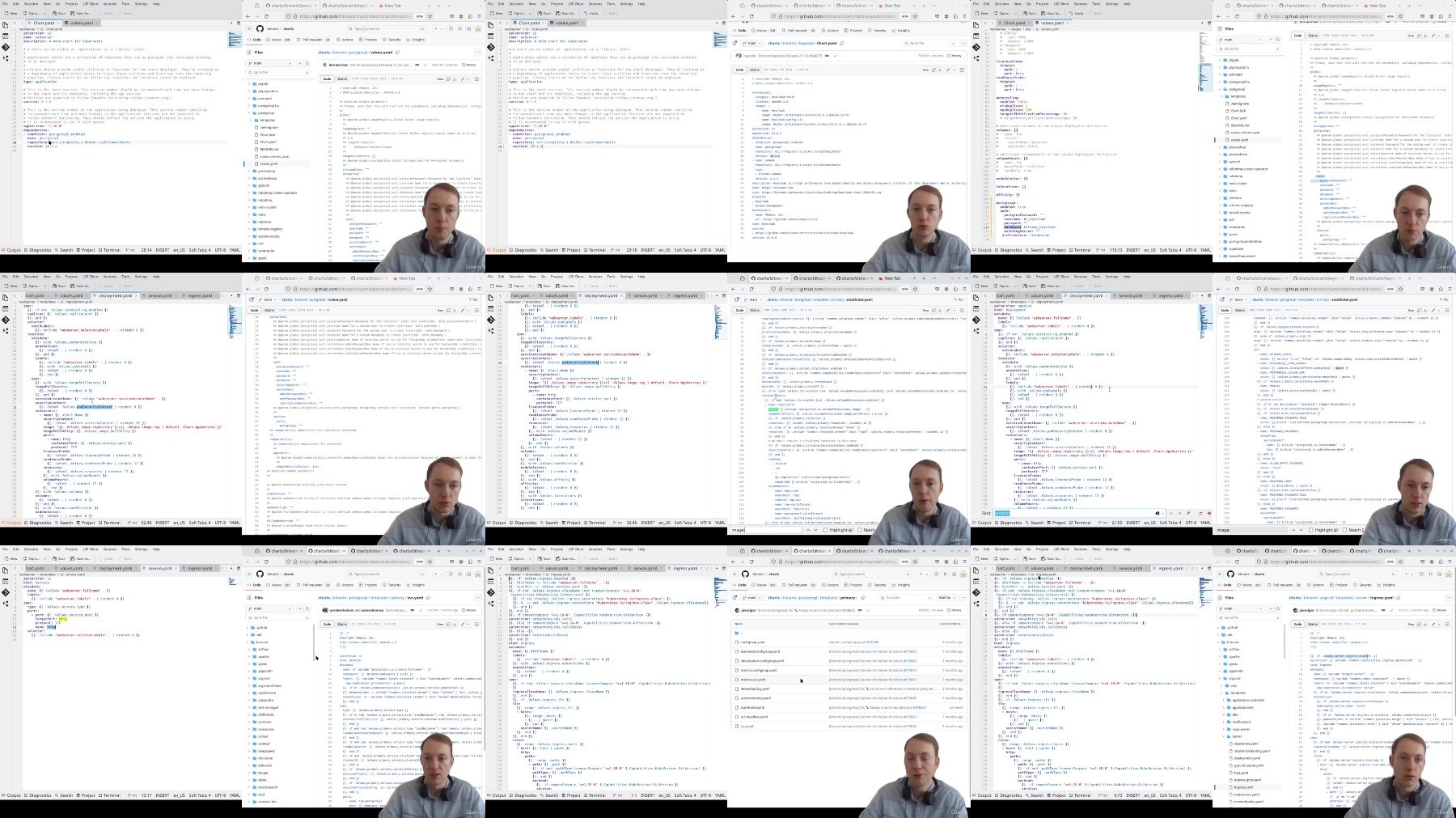
Troubleshooting Helm In Kubernetes - Your Guide Through It
Published 4/2024
MP4 | Video: h264, 1920x1080 | Audio: AAC, 44.1 KHz
Language: English
| Size: 2.28 GB[/align]
| Duration: 4h 23m
Learn about using Helm within a setup containing Kubernetes, Docker, Git, Argo-CD, Chartmuseum and Chaos Mesh!
[b]What you'll learn[/b]
Problem Identification and Analysis in Kubernetes environments using helm
Learn to design solutions and implementations using Helm's capabilities
Self-Reliance & Independent Research to compare own solutions to the ones shown in the lectures.
Community Contribution & Collaboration through validating different solutions with me and the community
[b]Requirements[/b]
Course suitable for DevOps beginners
No prior knowledge of Helm and Kubernetes required
[b]Description[/b]
Enjoy my course to troubleshooting excellence designed for people with a basic developer or system administration background. This course offers a deep dive into the world of Kubernetes, Helm, and ArgoCD, focusing on the critical skills needed to troubleshoot and optimize the application lifecycle in a cloud-native environment.What You Will Learn:Helm Deep Dive: Learn how to manage applications with Helm charts, including chart creation, GitOps integration and dependency management.Problem identification: Understand the components that make up a Kubernetes cluster.ArgoCD Integration: Explore continuous deployment with ArgoCD, covering application definitions, configurations, and sync policies.Troubleshooting Techniques: Gain expertise in identifying and resolving common issues in Helm releases, Kubernetes operations, and ArgoCD sync attempts.Best Practices: Adopt industry-standard practices for helm charts and automation of your deployment pipeline.Who This Course Is For:Developers seeking to enhance their Kubernetes and Helm skills.System administrators aiming to streamline application deployment and management.Course Requirements:Basic understanding of writing codeFamiliarity with command-line interfaces and YAML syntax.Access to a Kubernetes cluster for hands-on exercises (minikube or similar).Why Take This Course:With the rise of container orchestration and microservices, mastering Kubernetes and its ecosystem has become essential. This course empowers you to tackle real-world challenges involving Helm and GitOps. Participate now and become good at Helm and get a mindset that leads through all obstacles.About used Logos:Logos used in the course are used unchanged for educational purposes only:Logos from the CNCF/artwork repository:HelmKubernetesArgoChaos MeshChartmuseum by HelmMinikube from Kubernetes repo underCreative Commons Attribution 4.0 InternationalGit Logo by Jason Long is licensed under the Creative Commons Attribution 3.0 Unported License.Background music "Be corporate" by Veaceslav Draganov
Overview
Section 1: Introduction
Lecture 1 Why troubleshooting Helm is your key to success
Lecture 2 What is Helm?
Lecture 3 Why are we using Helm?
Section 2: Becoming familiar with the helm binary
Lecture 4 ACTION: Installing helm
Lecture 5 ACTION: Creating a Helm chart
Lecture 6 What is a Helm chart?
Lecture 7 Why are we using Helm charts?
Lecture 8 ACTION: Trying to install a Helm chart
Section 3: Set up a Kubernetes environment
Lecture 9 What is Kubernetes?
Lecture 10 Popular Kubernetes links visited
Lecture 11 Why are we using Kubernetes?
Lecture 12 ACTION: Installing minikube
Lecture 13 ACTION: Trying to start minikube
Section 4: Set up a Docker environment
Lecture 14 What is Docker?
Lecture 15 Info: Don't panic - Kubernetes removed Docker
Lecture 16 Why are we using Docker?
Lecture 17 ACTION: Installing docker
Lecture 18 ACTION: Testing docker
Lecture 19 Summary: We can continue using Helm!
Section 5: Using Kubernetes with Helm
Lecture 20 ACTION: Starting minikube
Lecture 21 ACTION: Installing kubectl
Lecture 22 ACTION: Setup OpenLens Kubernetes IDE
Lecture 23 ACTION: Using OpenLens Kubernetes IDE
Lecture 24 ACTION: Install the Helm chart
Lecture 25 ACTION: Uninstall the Helm chart
Lecture 26 ACTION: Rollback the Helm chart
Section 6: Modifying Helm charts
Lecture 27 ACTION: Listing all values
Lecture 28 ACTION: Editing Chart.yaml
Lecture 29 ACTION: Editing values.yaml
Lecture 30 ACTION: Trying to upgrade the helm chart
Lecture 31 ACTION: Troubleshooting upgrading our Helm chart
Lecture 32 ACTION: Planning multiple stages
Lecture 33 ACTION: Testing our multiple stages
Lecture 34 ACTION: A namespaced stage per folder
Lecture 35 ACTION: Making changes to prod stage in folder
Lecture 36 Collaboration with coworkers
Section 7: Scaling Helm for Teams
Lecture 37 What is Git?
Lecture 38 Why are we using Git?
Lecture 39 ACTION: Using Github as a Git Provider
Lecture 40 ACTION: Uploading the Code to Github
Lecture 41 ACTION: Clone and commit into our git repository
Lecture 42 ACTION: Creating git branches per feature
Lecture 43 ACTION: Merging branches via git
Lecture 44 Automation is missing
Section 8: Automating Helm with Argo CD
Lecture 45 What is Argo CD?
Lecture 46 Why are we using Argo CD?
Lecture 47 ACTION: Installing Argo CD as a Helm chart
Lecture 48 ACTION: Configuring Argo CD projects
Lecture 49 ACTION: Connecting Github with Argo CD
Lecture 50 ACTION: Creating our Argo CD Application
Lecture 51 Regularly updating Docker images
Section 9: Argo CD Image updater
Lecture 52 What is Argo CD Image updater?
Lecture 53 Why are we using Argo CD Image updater?
Lecture 54 ACTION: Configuring Github backend for Argo CD Image updater
Lecture 55 ACTION: Testing the Argo CD Image updater
Section 10: Creating your own Helm chart
Lecture 56 What is a best practices Helm chart?
Lecture 57 Where do we find good Helm charts?
Lecture 58 ACTION: Using a bitnami chart as a base
Lecture 59 ACTION: The connection between deployment, service and ingress
Lecture 60 Publishing of a Helm chart
Section 11: Registering your charts with Chartmuseum
Lecture 61 What is Chartmuseum?
Lecture 62 Why are we using Chartmuseum?
Lecture 63 ACTION: Starting Chartmuseum
Lecture 64 ACTION: Packaging our Helm chart into Chartmuseum
Lecture 65 ACTION: Interactions with Chartmuseum
Section 12: Helm Chaos Engineering
Lecture 66 What is Chaos Mesh?
Lecture 67 Why are we using Chaos Mesh?
Lecture 68 ACTION: Installing Chaos Mesh
Lecture 69 ACTION: Running a Chaos Experiment with Chaos Mesh
Lecture 70 Creating a troubleshooting list
Lecture 71 Our troubleshooting list
Section 13: Outro
Lecture 72 Summary of this course
Lecture 73 Where to head next?
Lecture 74 Giving feedback for this course
The course is aimed at DevOps beginners, developers and system adminstrators and people interested who are stuck with a problem with Helm and want to see it solved step by step.
https://fikper.com/5wZtdrRlMR/.Troubleshooting.Helm.in.Kubernetes.-.Your.guide.through.it.z01.html https://fikper.com/qE2V7zmEr9/.Troubleshooting.Helm.in.Kubernetes.-.Your.guide.through.it.z02.html https://fikper.com/gvqnhT6j6h/.Troubleshooting.Helm.in.Kubernetes.-.Your.guide.through.it.zip.html
https://rapidgator.net/file/d8bc1bca127718b7df820dc45ec4ba4f/.Troubleshooting.Helm.in.Kubernetes.-.Your.guide.through.it.z01 https://rapidgator.net/file/e3cab691d5b66e51a6c444c912793db4/.Troubleshooting.Helm.in.Kubernetes.-.Your.guide.through.it.z02 https://rapidgator.net/file/8b893d5319bef0abd67106bc75f68788/.Troubleshooting.Helm.in.Kubernetes.-.Your.guide.through.it.zip
Free search engine download скачать: Udemy - Troubleshooting Helm in Kubernetes - Your guide through it

